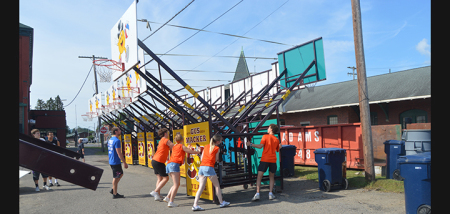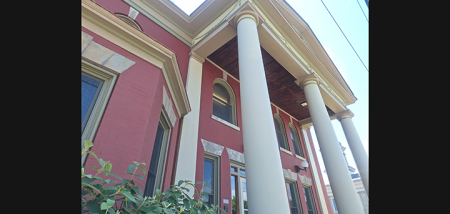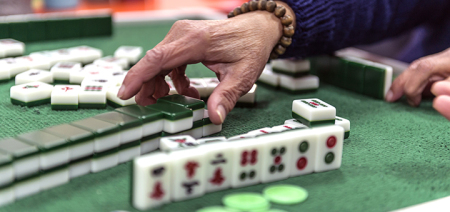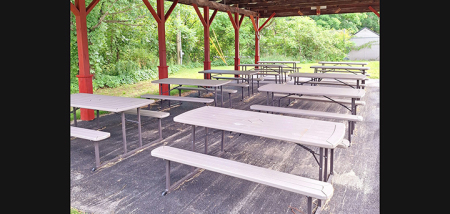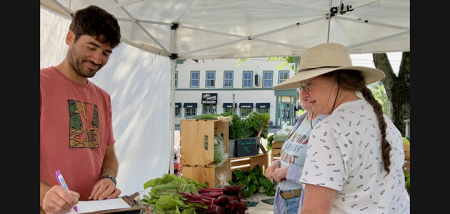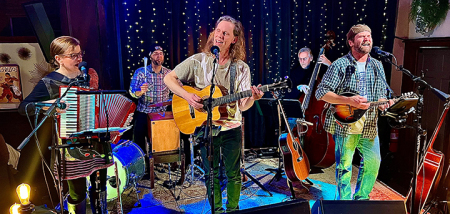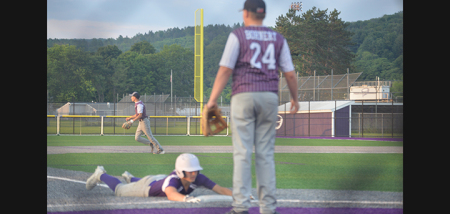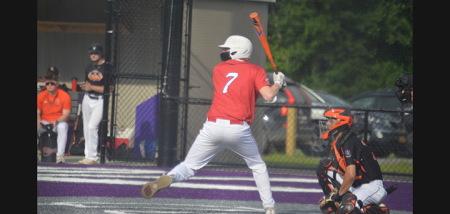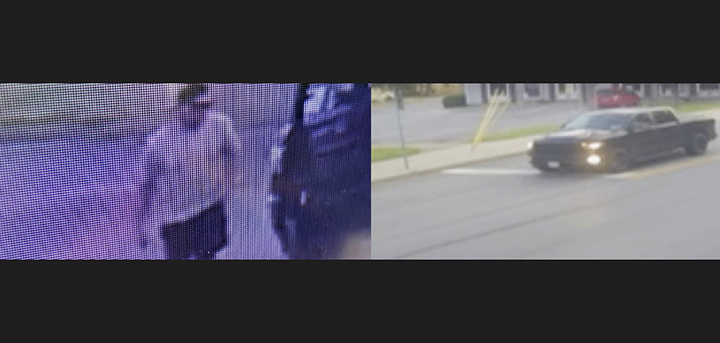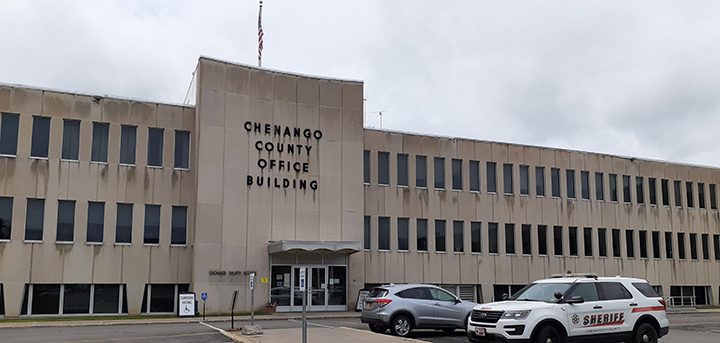Congressman Brindisi Answers Questions About His Reelection As He Fights For A Second Term
Published:
August 21st, 2020
By:
Tyler Murphy
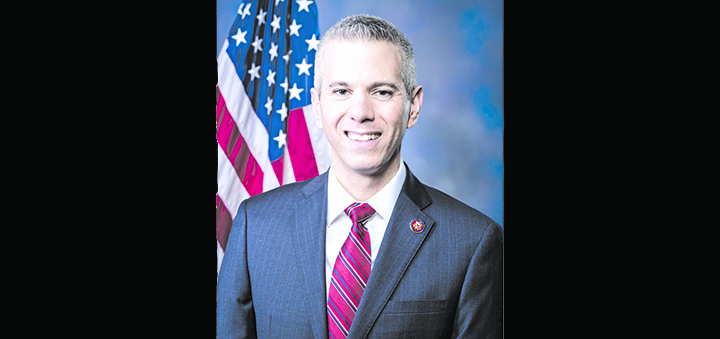 Representative Anthony Brindisi
Representative Anthony Brindisi
NORWICH – On Thursday Congressman Anthony Brindisi visited the Evening Sun and discussed his reelection campaign, his positions on national topics and what he has done for the residents of Chenango County.
He is in a close race against Republican Claudia Tenney for New York’s 22nd Congressional District.
Why has congress failed to pass aid for extending unemployment benefits?
“It’s been very frustrating watching the process break down on this next COVID relief package, because we were able to come together back in the Spring to pass four separate COVID relief packages that included things like the paycheck protection program, the additional unemployment insurance for people out of work, the stimulus checks, and in May the House passed something known as the Heroes Act, which is another economic stimulus package to respond to the pandemic. I supported it – it wasn’t perfect, but I thought it was a good stepping off point to begin negotiations with the Senate on the next relief package,” said Brindisi.
The congressman said the senate delayed responding to working on a new plan until the timeframe had become very narrow.
“The Senate felt that, at that point, we didn’t need another relief package, and waited about two months until about July and then said we need to come together and pass another relief package,” he said, “So there have been talks, and it looks as of now that those talks have broken down.”
“I’ve talked to county leaders here and other local officials, and they’ve all signed on to a letter that I circulated to leaders in Washington, saying we need to have state and local assistance in the next Coronavirus relief package. If we don’t get it, I worry about our hospitals being able to function to the level of service that we’ve come to expect, I worry about school districts being able to open in the next few weeks.”
Why did they breakdown?
“I think that leaders on both sides don’t want to compromise, and I think we need to compromise on a lot of these issues. The biggest issue for me is trying to get assistance to our local governments, our towns, cities and counties, as well as New York State, because New York State obviously was hit very hard in the early days of this pandemic. There’s been a significant drop in revenue that all of our counties and local governments have seen because of loss of sales tax, and New York State is going to be forced to make some significant cuts in areas like healthcare, education, infrastructure projects and aid to localities if they don’t get some help from the federal government.”
How would you rate New York State’s response to the Coronavirus?
“I would say, given the numbers right now, I think New York has responded pretty well to the Coronavirus. Our numbers are very low in the state right now compared to other states that are seeing problems. So from a healthcare perspective, I think New York State responded pretty well. There are certainly areas that I think New York could have done better.”
Brindisi said the state should have done better when Gov. Andrew Cuomo ordered nursing homes residents who tested positive for the virus be return to their care facilities instead of remaining or being moved to a separate medical facility, like a hospital. Critics have claimed this caused the virus to spread among their most vulnerable populations in the homes, and led to more deaths.
“The (NY State) response to coronavirus in our nursing homes, certainly there could have been a better response there. And I think there should be an independent review of not just New York State but the entire federal response to coronavirus, so we can correct any mistakes that were made for future pandemics. We have to learn from this,” said Brindisi.
Do you think that schools are safe to reopen in the district?
“I would say yes, with the caveat that I started off on a school board so I’m a big believer in local control,” said Brindisi. “So I wouldn’t want to hold every school district to the same standard – they have to do what’s right for the community that they’re in. Numbers may be higher in one community than another, school districts are different sizes, so I would very much leave it up to the local community to decide what’s best for that school district. You have to look at what the numbers are on the ground and respond to that.”
Chenango County is a rural county and our numbers have not been the same as the rest of the state. Yet we have the same generalized restrictions, even though we have only a handful of active cases at a time. Sometimes there is frustration about that locally – what would you say to people about that?
Brindisi said the New York was correct to break the state up into different regions and address the needs of each area separately.
“I would say that you shouldn’t hold areas to the same standard. Obviously New York City is where the epicenter of the pandemic was, and Chenango County should not be held to the same standard as New York City in terms of reopening,” he said. “And if the numbers continue to be low here, I think that businesses should be able to open quicker, same with schools. Schools should be able to open quicker for in-person instruction.”
Heading into the Presidential election, New York State is starting to look at options for voting. What is your opinion, is it safe enough to go to the polls or should people be voting remotely?
“If the election were tomorrow, then I would say it’s safe enough to show up at the polls. In two and half months from now, I’m cautious on predicting what things are going to look like at that point, because we’re entering in to the winter months and hopefully we don’t see a second wave of this virus in New York State, but if we do then we’ll have to reevaluate at that point to see what’s safe enough for the public to be able to do,” he said.
Do you think an election done by mail instead of in-person has the potential to be less secure than one that is done in-person?
“I don’t think so. If you look at other states that have had vote-by-mail for a long time, you have not seen evidence of widespread abuse. I’m more concerned, having looked at some of the intelligence reports, about outside interference from foreign actors on our election as opposed to what we would see here in this country.”
Brindisi said state should follow New York’s example and require a paper trail backup for all ballots.
“There are many states that don’t have a paper backup for ballots. In New York State, you have a paper ballot that goes into the [voting] machine, and if there’s a problem with that machine, you at least have that paper to go back and audit later on. Many states don’t have that,” he said, “You need to have a paper trail. Hackers can hack into those machines and change results. There was evidence of that back in 2016.”
We haven’t had everyone vote a whole election by absentee ballots before – isn’t that a different set of challenges?
“It does have different challenges, and that’s why I’m concerned with some of the cuts in the postal service, but I fully believe that the post office can handle an increased volume that may result from people voting remotely,” he said.
Brindis said he looks forward to being able to question the postmaster general who is coming before the U.S. House of Representatives next week. “I believe [ballots] should be treated as priority mail, and I believe that as long as your ballot is postmarked by election day, it should count.”
Some people are concerned that the government might be able to know how you voted, because after all, you are putting your name and ballot in an envelope and sending it in. How would you respond to people who have this concern?
“I would say you have to do what you think is comfortable. Some people may not mind if the public knows how they voted, other people consider that very private. I consider it very private. I’m probably going to utilize early voting -- that’s something that we now have in New York State. The polls are open nine days before the election now. But you can now vote early, and that’s something I’m going to take advantage of.”
There are a lot of people who are worried about the integrity of the election – not just because of COVID issues, but also because of national politics. Are you concerned about the perceived legitimacy of the election?
“I’m not. I think we can get through this election as we’ve done thousands of times over the course of our history, and I hope the election goes smoothly. I don’t want to see anyone be denied the right to vote,” said Brindisi.
What do we do to help the side that’s going to lose understand that it was a fair election?
“I can say that, historically we have always had peaceful transition between presidencies in this country, and I hope whatever side loses recognizes that and does what’s best for the country so we can move on. We can’t be involved in some endless election – we have to move on at some point,” he said.
When the protests began, we had New York State making special exemptions for mass gatherings and protests. How does that make any scientific sense?
“I think that any time you have large gatherings you have to be careful. I would encourage people to follow guidelines. I fully support people’s right to peacefully protest.”
Even during the pandemic?
“As long as they’re following CDC guidelines, absolutely. Just like I would support any gathering right now as long as it’s following CDC guidelines.
At the time the guidelines stated that there should be groups no larger than 10, should the protests be broken up if they violate CDC guidelines?
“I would say that any gathering that is violating CDC guidelines should be broken up, absolutely.”
There was an incredible response to the alleged murder of George Floyd. What’s your take on the reaction and protests?
“This is not an either –or type of question. To me, we should all be outraged over the murder of George Floyd, and recognize that there have to be some reforms enacted to improve the relationship between law enforcement and the communities that they are charged with protecting and serving. But we also have to recognize that, by and large, law enforcement does a great job. It’s a dangerous profession. Are there bad actors, absolutely, and those bad actors should be weeded out. However, I’m 100 percent against any movement to try and defund the police or abolish the police.
You don’t support defunding the police?
“I am 100 percent against it. Not only am I against it, I’ve actually introduced a bill, I’m the democratic co-sponsor of a bill that’s called Defund Cities that Defund the Police. So if a city or state chooses to abolish or significantly cut a police department, they would be at risk of losing certain federal funding.”
That must put you in contrast with some of your colleagues. Why do you think some of your democratic colleagues see it a different way and how are you trying to convince them of your point of view?
“I think we all have to take a step back. One of the best ways to really improve relations between police and communities is to invest in areas where police need help. We should be investing in education. We should be investing in mental health services. Cops are being asked to do all kinds of things that they didn’t have to do 30, 40, 50 years ago. They’re teachers, they’re healthcare professionals, they’re mental health councilors. When they show up at a scene you never know what you’re going to find there, so they have to be able to respond to that. Police need some help. So that’s where we should be investing, in mental health services, we should be investing in education, especially at the early ages to help put people on a pathway to becoming a productive citizen. That will help lessen the amount of crime out there.”
Do you think there is systemic racism in the police departments in the district?
“I would say by and large that the police departments in this district do a good job,” he said.
“There’s definitely disparities in healthcare between low income communities and people who are more affluent. And we have to look at that. It doesn’t only affect low income Black people, it affects people in rural areas too who may be low income. We have to look at how we improve education for everybody and make it equal for everyone, not just the wealthy, and how do we make healthcare more accessible for everybody, not just for people who can afford I,” said Brindisi.
“We have a very rural district. NY 22nd is one of the most rural districts in the entire country, and there are huge disparities in terms of education and healthcare. Take an issue like broadband. We know the challenges in Chenango County when it comes to high-speed internet.”
About a year ago Brindisi met with one of the FCC commissioners. They examined a map of New York State showing access to high-speed internet.
“You would think that everyone in the state has access to high-speed internet. But I know, because I represent a rural district, that there are many people who don’t have internet at their home. They may be struggling with dialup or some shoddy satellite service. So why is the FCC saying that everyone has access to internet in the state when I know that’s not the case in places like Chenango County?”
“One of the big problems is that the maps that the FCC uses to determine broadband are outdated. So if there’s one house in a thousand-home census track that has high-speed internet, then the FCC considers that entire thousand-home track to be served by high-speed internet. It’s crazy,” he said.
Brindisi conducted his own survey in the district about internet coverage and is takign those results to FCC.
“So we partnered with this nonprofit group that does internet speed tests, and we started a survey of the district to determine where the gaps in coverage are for high-speed internet. We had about 1000 mailed-in responses from people who didn’t have internet access, and we had about 110,000 people go on to the website to test their internet speeds, so you can see our report that tracks all of the various internet speeds from the towns and villages in Chenango County. Chenango County is one of the slowest in the state in terms of internet speeds.”
“Now one of the big problems we have is that a lot of the large internet companies, like Spectrum, will not go into a rural area because they don’t see profit there. To me, high-speed internet is so necessary nowadays that it shouldn’t be so profit-driven, he said. “Parents were asked to work from home because businesses were shut down. If you don’t have high-speed internet, how do you do that? So I would say that, in 2020, high-speed internet is a necessity in your daily life.”
If you want to learn more about Congressman Brindisi’s responses during our interview – about the Russia investigation, impeachment, New York State bail reform, the assigning of driver’s license to illegal immigrants, supporting local agriculture, the threat of China and American manufacturing, and mental health reform, read about it in Monday’s edition of The Evening Sun.
Author: Tyler Murphy - More From This Author
Comments
